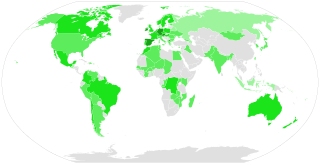A coalition government is a form of government in which political parties cooperate to form a government. The usual reason for such an arrangement is that no single party has achieved an absolute majority after an election, an atypical outcome in nations with majoritarian electoral systems, but common under proportional representation. A coalition government might also be created in a time of national difficulty or crisis to give a government the high degree of perceived political legitimacy or collective identity, it can also play a role in diminishing internal political strife. In such times, parties have formed all-party coalitions. If a coalition collapses, the Prime Minister and cabinet may be ousted by a vote of no confidence, call snap elections, form a new majority coalition, or continue as a minority government.
Civic Platform is a centre-right liberal political party in Poland. Since 2021, it has been led by Donald Tusk, who previously led it from 2003 to 2014 and was president of the European Council from 2014 to 2019.
Solidarity Electoral Action was a coalition of political parties in Poland, active from 1996 to 2001. AWS was the political arm of the Solidarity trade union, whose leader Lech Wałęsa, was President of Poland from 1990 to 1995, and the successor of the parties emerged from the fragmentation of the Solidarity Citizens' Committee.
The Polish People's Party is an agrarian political party in Poland. It is currently led by Władysław Kosiniak-Kamysz.

A green party is a formally organized political party based on the principles of green politics, such as social justice, environmentalism and nonviolence.
Social conservatism is a political philosophy and a variety of conservatism which places emphasis on traditional power structures over social pluralism. Social conservatives organize in favor of duty, traditional values and social institutions, such as traditional family structures, gender roles, sexual relations, national patriotism, and religious traditions. Social conservatism is usually skeptical of social change, instead tending to support the status quo concerning social issues.
A political party platform, party program, or party manifesto is a formal set of principal goals which are supported by a political party or individual candidate, in order to appeal to the general public, for the ultimate purpose of garnering the general public's support and votes about complicated topics or issues. A component of a political platform is often called a plank – the opinions and viewpoints about an individual topic, as held by a party, person, or organization. The word "plank" depicts a component of an overall political platform, as a metaphorical reference to a basic stage made of boards or planks of wood. The metaphor can return to its literal origin when public speaking or debates are actually held upon a physical platform.

The Fiji Labour Party, also known as Fiji Labour, is a political party in Fiji. Most of its support is from the Indo-Fijian community, although it is officially multiracial and its first leader was an indigenous Fijian, Dr. Timoci Bavadra. The party has been elected to power twice, with Timoci Bavadra and Mahendra Chaudhry becoming prime minister in 1987 and 1999 respectively. On both occasions, the resulting government was rapidly overthrown by a coup.

The Democratic Coalition is a social-liberal and social-democratic political party in Hungary led by former Prime Minister Ferenc Gyurcsány. Founded in 2010 as a faction within the Hungarian Socialist Party (MSZP), the Democratic Coalition split from the MSZP on 22 October 2011 and became a separate party. It has fifteen MPs in the National Assembly and four MEPs in the European Parliament.
In representative democracies, a mandate is a perceived legitimacy to rule through popular support. Mandates are conveyed through elections, in which voters choose political parties and candidates based on their own policy preferences. The election results are then interpreted to determine which policies are popularly supported. A majority government provides a clear mandate, while plurality or coalition government suggests a lesser mandate, requiring greater compromise between parties. Parties with strong mandates are free to implement their preferred policies with the understanding that they are supported by the people. When no mandate exists for a single party, the median voter may be used to determine what policies have a mandate for implementation. The modern concept of a political mandate first developed around the 16th century and became a prominent aspect of politics after the French Revolution.
Poland has a multi-party political system. On the national level, Poland elects the head of state – the president – and a legislature. There are also various local elections, referendums and elections to the European Parliament.

Parliamentary elections were held in Poland on 23 September 2001 to elect deputies to both houses of the National Assembly. The election concluded with an overwhelming victory for the centre-left Democratic Left Alliance – Labor Union, the electoral coalition between the Democratic Left Alliance (SLD) and the Labour Union (UP), which captured 41% of the vote in the crucial lower house Sejm. The 2001 election is recognized as marking the emergence of both Civic Platform (PO) and Law and Justice (PiS) as players in Polish politics, while also witnessing the outright collapse of the Solidarity Electoral Action (AWS) and its former coalition partner, the Freedom Union (UW).

Federal elections were held in Germany on 18 September 2005 to elect the members of the 16th Bundestag. The snap election was called after the government's defeat in the North Rhine-Westphalia state election, which caused them to intentionally lose a motion of confidence to trigger an early federal election. The outgoing government was a coalition of the centre-left Social Democratic Party of Germany (SPD) and Alliance 90/The Greens, led by federal Chancellor Gerhard Schröder. The election was originally intended for the autumn of 2006.

Left and Democrats was a centre-left electoral alliance of political parties in Poland which was created on 3 September 2006, before the Warsaw municipal election of 2006. The coalition's aim was to provide an alternative for both Law and Justice and Civic Platform, which have been Poland's two major political parties since 2005. LiD contested their first national election in October, 2007 and won 53 seats to the Polish parliament, the Sejm. The LiD alliance was dissolved in April 2008, following a rift between the member parties.

The Republican Party of Georgia, commonly known as the Republicans, is a political party in Georgia active since 1978. Until March 2016, the party was a part of the Georgian Dream coalition that won the 2012 election, defeating the United National Movement. Currently it is in opposition to Georgian Dream as part of the UNM-led Strength Is in Unity coalition.

Parliamentary elections to both the Senate and the Sejm were held in Poland on 9 October 2011. The previous election, in 2007, resulted in a Civic Platform–Polish People's Party government. All seats of both Houses were up for re-election.
Politics in Israel are dominated by Zionist parties. They traditionally fall into three camps, the first two being the largest: Labor Zionism, revisionist Zionism, and religious Zionism. There are also several non-Zionist Orthodox religious parties and non-Zionist secular left-wing groups, as well as non-Zionist and anti-Zionist Israeli Arab parties.

Parliamentary elections were held in Poland on 13 October 2019. All 460 members of the Sejm and 100 senators of the Senate were elected. The ruling Law and Justice (PiS) retained its majority in the Sejm, but lost its majority in the Senate to the opposition. With 43.6% of the popular vote, Law and Justice received the highest vote share by any party since Poland returned to democracy in 1989. The turnout was the highest for a parliamentary election since the first free elections after the fall of communism in 1989. For the first time after 1989, the ruling party controlled one house, wile the opposition controlled the other.
The Civic Coalition is a catch-all political alliance currently ruling in Poland. The alliance was formed around Civic Platform in opposition to the then-ruling Law and Justice (PiS) party.








